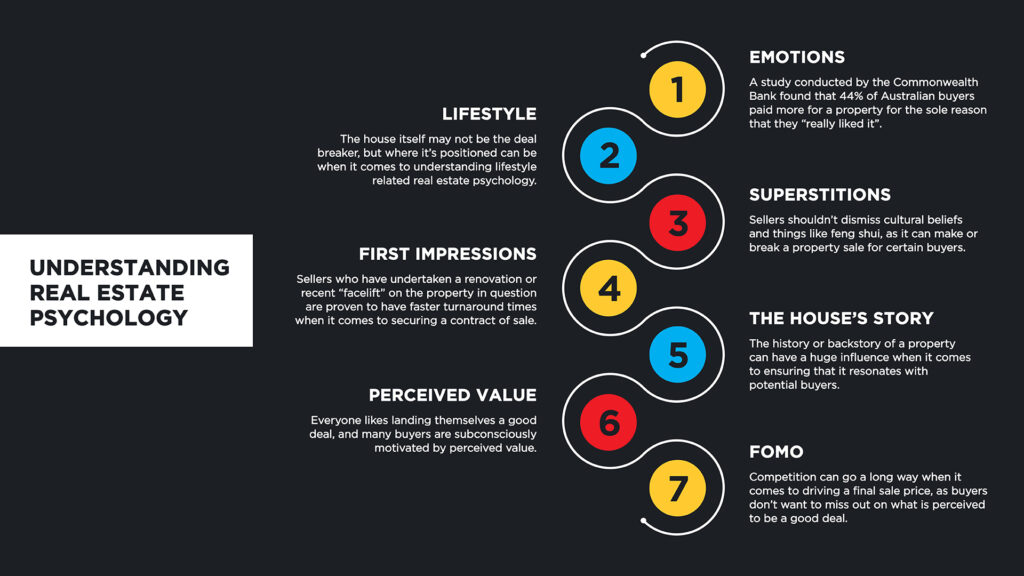When it comes to understanding the factors behind what drives people to buy a particular home, the basics of real estate psychology offers some insight.
In the world of property and apart from the obvious need to invest or put a roof over our heads, why do we buy? What key elements influence potential shoppers into making a decision to purchase a particular home or property? Is it a case of head vs heart, or something more?
Whether we like it or not, real estate psychology is a deeper level of what drives us towards making decisions surrounding property purchases. Although it can vary from person to person, the forces at play influence our choices when it comes to what is arguably the biggest purchase of our lives, such as emotions, logic and even our imagination. If you’re trying to decipher real estate psychology as a seller, then it’s important to understand the many complexities involved and the factors that can ultimately drive a potential buyer to be a new home owner.
Seven Key Factors Linked To Real Estate Psychology
By definition, psychology is classed as the scientific study of the human mind and its functions, especially those affecting behaviour in a given context. As such, in the world of real estate, how our brain relates to a property can absolutely influence how we feel about it and our decision making process. In order to understand why people buy, there are a few areas that are commonly thought to play key roles.

Emotions – Particularly relevant for owner occupiers, people tend to buy property from the heart, and the figures are there to prove it. So much so, that a study conducted by the Commonwealth Bank found that 44% of Australian buyers paid more for a property for the sole reason that they “really liked it”. Quite simply, people really do fall in love with properties.
Lifestyle – If a buyer is interested in properties by the beach, they are likely to be fans of an active lifestyle that includes morning walks along the sea, an afternoon surf or weekend brunch at their favourite local café. The house itself may not be the deal breaker, but where it’s positioned can be when it comes to understanding lifestyle related real estate psychology.
Superstitions – For a lot of potential buyers, numbers do matter – but perhaps not the ones you would initially think. In many cultures, the numbers linked to a home can affect whether a property is a good fit for the superstitious. Sellers shouldn’t dismiss cultural beliefs and things like feng shui, as it can make or break a property sale for certain buyers.
First Impressions – You only get one chance to make a good impression, so make it count. Sellers who have undertaken a renovation or recent ‘facelift’ on the property in question are proven to have faster turnaround times when it comes to securing a contract of sale, so ensure that you don’t skip certain procedures like maintenance and property styling.
The House’s Story – The fine art of storytelling is one of the fundamentals in just about any form of sales or marketing, and real estate is no exception. The history or backstory of a property can have a huge influence when it comes to ensuring that it resonates with potential buyers, and helps to romanticise the process of them envisioning themselves in the home.
Perceived Value – Everyone likes landing themselves a good deal, and many buyers are subconsciously motivated by perceived value. The belief that they are getting a good bang for their buck motivates and instills confidence, so try to ‘add value’ whenever possible when selling a property, even if it’s as simple as a new coat of paint.
FOMO – “Fear Of Missing Out” – or FOMO – is a real estate agent’s dream scenario. Competition can go a long way when it comes to driving a final sale price, as buyers don’t want to miss out on what is perceived to be either a good deal, the property of their dreams, or perhaps a combination of the two. Ultimately, it’s a powerful feeling that shouldn’t be underestimated.
Should you be looking to sell your home, enlisting the services of a free property advisor like ESPA can often be a game changer for vendors. As an example, your advisor would likely research the property, local agents, check the zoning, evaluate market conditions, and communicate clearly with the owner regarding all of their options, and can be particularly useful when it comes to choosing a real estate that’s right for you that is able to navigate the many complexities of basic real estate psychology. When working with a reputable advisor, this often results in homeowners being able to sell their property for significantly more than they initially thought possible.
Take The Stress Out Of Selling Property
A completely free service, Emergency Services Property Advisors provide property advisor services to Police, Fire, Ambulance and S.E.S personnel and their families right across Victoria.
Luke and the team at ESPA are passionate about providing support to some of Australia’s most valued public servants. Along with key industry insights, ESPA also works with a broad range of service providers linked to the real estate industry such as conveyancers, trades, legal practitioners and mortgage brokers.
If you are an emergency services worker looking to potentially buy or sell property in the future, please get in touch with Emergency Services Property Advisors today to discuss how we can turn your real estate dreams into reality, or call Luke directly on 0414 757 705.


